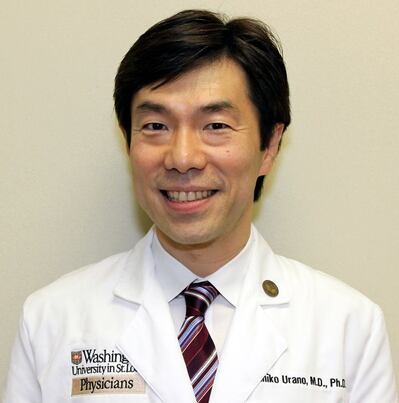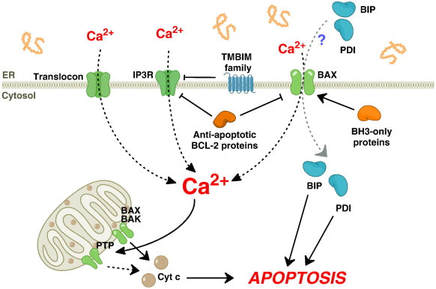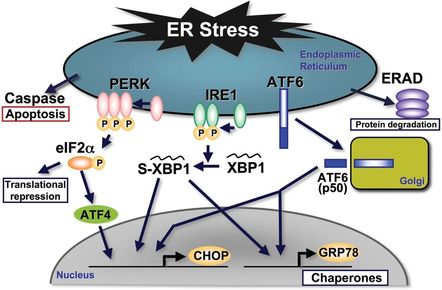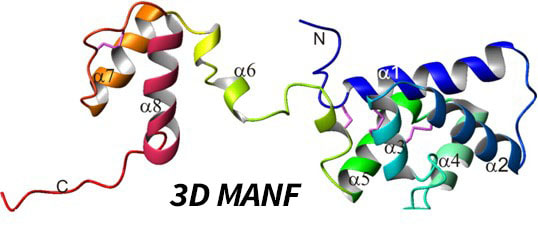Fumihiko Urano, MD, pHD
Biography
|
Fumihiko “Fumi” Urano, MD, PhD is a physician and medical researcher focusing on rare disease therapies. Dr. Urano received his MD and completed Residency in Pathology and Medical Genetics at the Keio University School of Medicine in Tokyo, Japan. He subsequently did a fellowship in pediatric pathology/oncology/medical genetics at the Keio University School of Medicine. Dr. Urano was then a molecular Pathogenesis fellow at New York University School of Medicine. From 2002 to 2012 he was associate professor of Molecular Medicine at the University of Massachusetts Medical School. Currently Dr. Urano is based at Washington University School of Medicine in St. Louis where he is a Professor of Medicine (endocrinology), holds the Samuel E. Schechter Professorship in Medicine, and is a staff physician at the Barnes-Jewish Hospital.
Dr. Urano is a driving force in the study of Wolfram syndrome, a rare genetic disorder characterized by juvenile-onset diabetes, retinal degeneration, and early-onset neurodegeneration. As the Director of the Wolfram Syndrome International Registry and Clinical Study he has been leading the clinical, translational, and interventional studies of Wolfram syndrome supported by the National Center for Advancing Translational Sciences (NCATS)/NIH and the ICTS of Washington University. Dr. Urano's collaboration with colleagues around the world has allowed him begin a clinical trial dedicated to the treatment of this devastating genetic disease. His current focus is on finding novel treatments for juvenile-onset diabetes and retinal degeneration using regenerative gene therapy, computer-based design of new drugs, and gene-based diagnostics. Dr. Urano's team is currently developing novel therapeutics for juvenile diabetes and genetic forms of diabetes including Wolfram syndrome using induced-pluripotent stem cells (iPSCs) derived from patients’ skin cells. His team is also developing a method for the regeneration of insulin-producing cells using a trophic factor. Dr. Fumi Urano is an advocate for patients with rare genetic disorders and a core member of the rare disease data repository program at the NCATS, which connects patients, physicians, and researchers with resources and treatment updates. |
Understanding the Treatment Plan
|
Although Wolfram syndrome is a rare disorder, novel treatments for WS can also treat patients suffering from diabetes, neurodegenerative diseases, and retinal degeneration. A cure for Wolfram syndrome could lead to a cure for other more common diseases.
|
|
|
Treatments are aimed at supporting wolframin in its various roles, encouraging cellular regeneration, and ultimately correcting the genetic defect.
|
Stop Progression - ER Calcium Stabilizers,
ER Stress Reducers
& Molecular Prosthetics
ER Calcium Stabilizers
|
One of the common molecular pathways altered in patients with Wolfram syndrome, neurodegenerative diseases, and diabetes patients is imbalanced cellular calcium homeostasis. More specifically, endoplasmic reticulum (ER) calcium levels are lower in patients with Wolfram syndrome, leading to cell dysfunction and death. Dr. Urano is currently testing if an ER calcium stabilizer, dantrolene sodium, can delay the progression of Wolfram syndrome. In collaboration with NIH/NCATS, he is also developing novel ER calcium stabilizers (i.e., second generation dantrolene) for the treatment of Wolfram syndrome.
|
Ongoing Clinical Trial of Dantrolene Sodium in Pediatric and Adult Patients with Wolfram Syndrome - to assess the safety and tolerability of dantrolene sodium in patients with Wolfram syndrome - This study will assess the efficacy of dantrolene sodium on the cardinal manifestations of Wolfram syndrome, including visual acuity, remaining beta cell functions, and neurological functions.
ER Stress Reducers/Molecular Prostheses
|
A common problem in patients with Wolfram syndrome is ER stress caused by the expression of mutant wolframin protein produced in patients’ cells. ER stress can ultimately result in cell death or apoptosis. To resolve this issue, Dr. Urano has been developing molecular prostheses that can optimize the structure and conformation of mutant wolframin protein. Properly folded wolframin protein should result in resolution of ER stress and reduction of cell death.
Dr. Urano and Amylyx Pharmaceuticals, Inc. are working together to evaluate a novel therapeutic in induced-pluripotent stem cells (iPSCs) and mouse models to determine whether this therapeutic has potential to act as a molecular prosthetic/ER stress reducer to treat the disease.
Together with NIH/NCATS work is underway to develop a molecular prosthetic/ER stress reducing agent to delay/halt the progression of the Wolfram syndrome. |
Protect and Regrow Remaining Tissue- MANF
Regenerative therapy / MANF
|
Dr. Urano's second step towards a cure for Wolfram syndrome is to protect and regrow remaining tissue using regenerative therapy. His group has discovered a molecule that is produced naturally in the body that can activate the proliferation of damaged beta cells and brain cells. Expression levels of this molecule, MANF, are usually low in the human body.
|
Dr. Urano's group is developing a method to enhance the activity of MANF using a pill that can mimic the functions of MANF and gene therapy (i.e., produce a safe virus expressing MANF to transfect into patients’ cells with resultant expression/creation of MANF within the cell). This treatment could then be applicable to Wolfram syndrome as well as other forms of neurodegenerative disease.
Dr. Urano's team is also developing a method for the regeneration of insulin-producing cells using a trophic factor.
Dr. Urano's team is also developing a method for the regeneration of insulin-producing cells using a trophic factor.
Replace Pathogenic genes - AAV-WFS1,
then CRISPR CAS 9
AAV transfection of Wildtype WFS1
Dr. Urano's research is ongoing to evaluate AAV as a transfer vector of wildtype WFS1 in mouse models. Successful transfection of wildtype WFS1 to cells would result in production of fully functioning wolframin protein within the cell.
CRISPR CAS 9
To work toward a cure for Wolfram syndrome the root cause of the disease, loss of function due to mutation of the WFS-1 gene must be targeted. Using CRISPR/CAS9 technology Dr. Urano is attempting to replace a pathogenic Wolfram gene with a healthy WFS-1 gene. This work is currently being done using induced pluripotential stem cells (iPSCs) generated for study of treatments for WS.




